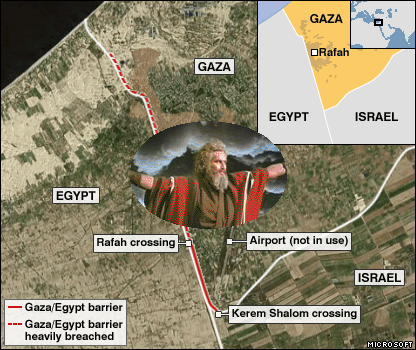
Remember the Exodus? Even if you never saw Charlton Heston part the waters Hollywood style, the story of the mistreatment of the descendants of the patriarch Jacob of Israel and their harrowing escape from the clutches of a hard-hearted Pharaoh has been retold millions of times over the past two millennia or more. In that story the more that Moses and brother Aaron demand “Let my people go,” the more the burden on the people, including the last straw, literally the last straw, in a work force up against a mud brick wall. Things got so bad that even the supervisors tried to reason with Pharaoh, but to no avail. So Moses in frustration turned to his Lord and complained in plain King James English:
And Moses returned unto the LORD, and said, Lord, wherefore hast thou so evil entreated this people? why is it that thou hast sent me? For since I came to Pharaoh to speak in thy name, he hath done evil to this people; neither hast thou delivered thy people at all. (Exodus 5:22-23)
Then came the plagues worthy of a passionate Mel Gibson remake: Nile water turned into blood, frogs everywhere, pesky gnats and flies (hardly anything new, I should suspect), the heavy vegan-friendly killing off of horses, donkeys, camels and flocks, then festering boils, heaven-sent hail and fire (an interesting notion for resolving global warming), lots and lots of locusts (some of which may have been kosher), total darkness and then the ultimate weapon of killing every non-Israelite firstborn. One would think this would be enough for several movies, but the journey has not even begun. That exodus, hardly a march of triumph, would condemn the brickmakers of Egypt to forty years wandering in the desert. Where is Mel Brooks when you need him?
Yesterday the irony of contemporary politics put the exodus in reverse. As reported by the BBC:
Tens of thousands of Palestinians have surged into Egypt from the Gaza Strip after masked militants destroyed parts of the border wall.
Gazans rushed to buy food, fuel and other supplies that have become scarce because of an Israeli blockade – aimed at stopping rocket attacks from Gaza.
Egyptian police took no action to stop people crossing.
Egypt’s President Hosni Mubarak says he allowed Gazans in to buy food, but Israel urged Egypt to restore security.
What a pathetic turn of prophetic events. This time the hard-hearted taskmaster is the Israeli government and Egyptian President Mubarak is the soft touch for people who have no food to buy on the other side of the fence. There has been plenty of blood shed, perhaps not enough to fill the Nile basin, and enough young Palestinian men (not just the firstborn) have been sacrificed. The leader of Hamas is hardly Moses, but the walking in circles in the wilderness (without a roadmap for peace) is indeed an apt metaphor.
Daniel Martin Varisco